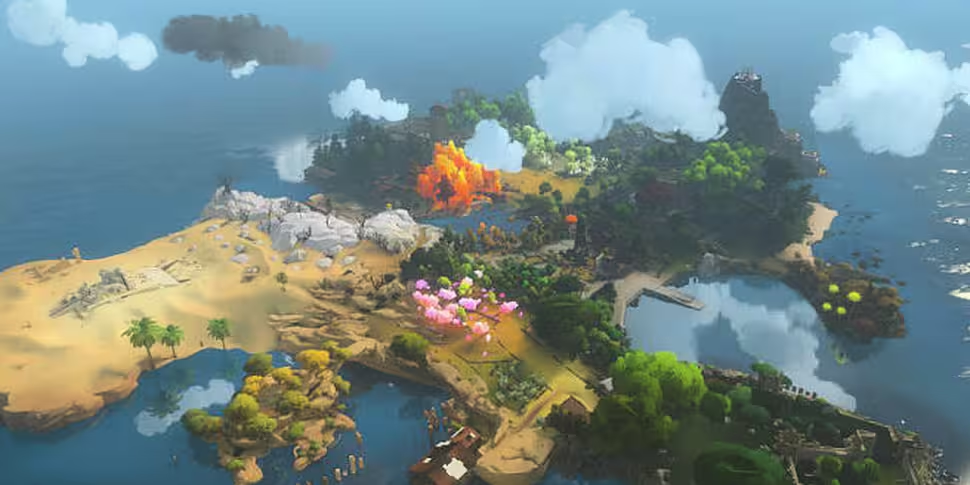The Witness, released back in January, is an extraordinary game for a number of reasons.
There's the stunning art and world design. There's the game's mature, experimental approach to narrative. There's the sheer ingenuity of the puzzle design throughout, and the subtlety with which it communicates its rules. But perhaps above all else what impresses is its sense of purpose.
For a game that will easily take most players a few dozen hours to work through - more if you're willing to dig into the layers of secrets on offer - it is almost entirely free of dead space. The mechanics - variations on the simple idea of drawing a line through a maze - evolve and surprise right up until the final area, with almost no repetition. Each puzzle has something new to offer, or at very least offer a new variation on existing ideas. It even carries over to the geography and architecture of the island, where there's no waste.
It's comparable to something like the Super Mario Galaxy games, where Nintendo were confident enough to introduce brilliant new ideas from level to level at dizzying speed - and moving on from them just as quickly.
The Witness' lead designer, Jonathan Blow (of Braid fame), was certainly correct when he claimed The Witness has "no repetition or filler". Indeed, many games' propensity for time wasting is something the outspoken Blow has criticised in the past.
He once suggested that MMOs (massive multiplayer online games) "are notorious for having relatively empty gameplay, but keeping players hooked with constant fake rewards – this creates 'the treadmill.' Rewards are a way of lying to the player so they feel good and continue to play the game".
Many games are fundamentally built on having players repeat the same task over and over again, with only minor variations (if even). MMOs are one example, but so is something like Diablo - a game where you constantly kill (or 'click on') waves upon waves of monsters as you level up and hope for better loot.
There's also the infamous "30 seconds of fun" upon which Halo (and countless others) was built - a short gameplay loop designers hope will be satisfying enough to keep players engaged for hours and hours, as long as there's occasionally variations on the theme. Some RPGs or online shooters demand dozens if not hundreds of hours of play to reach the top levels, but many have played almost all their cards within the first couple of hours.
There is a place for this style of design - something like Diablo can without question be a satisfying way to unwind. But that so many games 'waste' so much of the player's time is quite unfortunate. Even the language we use to discuss certain aspects of game design - such as 'grinding' (repeating a task at length to, for example, level up or win a specific item) - implies repetition.
Let's not even get started on the genuine time wasting inherent in social game design, such as Farmville, The Simpsons: Tapped Out or Candy Crush, that often requires the player to pay to skip lengthy wait times. Some games of this ilk have no meaningful gameplay whatsoever other than asking the player to repeat some mindless input and wait for a 'reward'. It's a school of design cleverly satirised in Ian Bogost's Cow Clicker.
In bigger titles, other design elements - such as collectibles, achievements or difficulty levels - often are used to encourage players to repeat basic tasks over and over ('kill 100,000 monsters', 'collect 100 flags', 'prestige ten times'). Open world games often feature maps overflowing with 'stuff', but how much of that is genuinely new, worthwhile stuff?
One issue often put forward in favour of said 'stuff' is value for money. There's no doubt AAA games are expensive these days, certainly compared to watching a film or something like that - spending 60 quid on a five or six hour game is totally understandably a big ask for many. But really is 'quantity over quality' really something to be encouraged, especially when most games drop in price so quickly and frequently?
The Witness is one game that shows how refreshing it can be to step away from this style of design. But it's not alone. One of the welcome benefits of the switch to digital downloads has been the emergence of 'short games'. These games often focus on a story or mechanic over a shorter running time than your usual big budget retail release.
Titles like Gone Home, Grow Home (very different but equally worthwhile games despite the similarity in their titles!), The Stanley Parable, Her Story, Journey, Superhot, Everybody's Gone to the Rapture... These games are interesting because they don't overstay their welcome, exploring what they need to in a confident, efficient way.
Some games need a lot of time for designers and players to properly explore their robust mechanics - ask any Street Fighter fan - and there'll always be a place for a good, satisfying epic that deserves hours of our attention. At the same time, though, wastage is something that has become almost endemic in the way games are made.
To convince more people that games are not just a silly waste of time and energy - which is nonsense, given how rich and diverse the medium has become - more games, even mostly excellent ones, should probably actually stop wasting our time in the first place.









